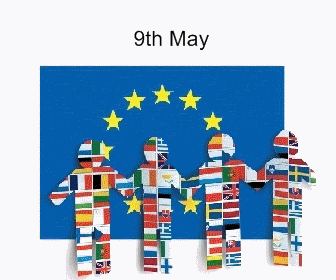
sestdiena, 2009. gada 12. decembris
svētdiena, 2009. gada 6. decembris
Christmas
pirmdiena, 2009. gada 19. oktobris
sestdiena, 2009. gada 17. oktobris
Thank you, Poland!
That was just one week, but it has left deep footprints in many hearts, full of new experience, new knowledge about Polish culture, traditions, customs and people.
It was a great opportunity to see major sights of Krakow; to visit Poland's winter capital- Zakopane located at the foot of Tatra Mountains, to get a taste of the highlander's smoked cheese- oscypek; to visit Auschwitz- Birkenau and the Kingdom of Salt- Wieliczka Salt Mine.
We can never thank you enough... but we'll try!
Thank you so much!
It was a great opportunity to see major sights of Krakow; to visit Poland's winter capital- Zakopane located at the foot of Tatra Mountains, to get a taste of the highlander's smoked cheese- oscypek; to visit Auschwitz- Birkenau and the Kingdom of Salt- Wieliczka Salt Mine.
We can never thank you enough... but we'll try!
Thank you so much!
svētdiena, 2009. gada 13. septembris
svētdiena, 2009. gada 30. augusts
sestdiena, 2009. gada 22. augusts
trešdiena, 2009. gada 15. jūlijs
trešdiena, 2009. gada 8. jūlijs
Baltica 2009

When:
8- 12 Jul 2009
Where:
Riga
Since 1988 the three Baltic nations have joined together each year to celebrate their folk heritage with the International Folklore Festival Baltica. Latvia, Lithuania and Estonia take it in turns to host the festival. In 2009 it returns to Latvia.
The three Baltic communities welcome folk groups from around the world for a week of food, film, dance and music, complete with workshops in regional dancing.
otrdiena, 2009. gada 30. jūnijs
pirmdiena, 2009. gada 8. jūnijs
sestdiena, 2009. gada 6. jūnijs
Midsummer's Eve

23 Jun 2009- Ligo day (diena)
This day is celebrated throughout Latvia. Ligo Diena is the annual celebration of the Summer Solstice which marks the longest day of the year and is celebrated on Midsummer's Eve. It is an ancient practice which dates back to pre-Christian times and has many rituals that are closely associated with nature and the hope for a good harvest in the autumn. It is a time to be with friends, family and loved ones and is usually celebrated with a big meal during the day before heading out to one of the many public parties which involve traditional dances and more eating, drinking and singing. Bonfires are also lit which is a ritual that links back to the old tradition of cleansing and warding off evil spirits. The day is a national holiday in Latvia, as is Midsummer's Day which is known as Jani too.
svētdiena, 2009. gada 24. maijs
Hooray! School's out!
sestdiena, 2009. gada 9. maijs
otrdiena, 2009. gada 21. aprīlis
Slovenia
Thank you very much for the unforgettable time in Slovenia.It was just fantastic! One day we hope to return!
ceturtdiena, 2009. gada 26. marts
otrdiena, 2009. gada 24. marts
ceturtdiena, 2009. gada 19. marts
Lieldienas- Easter

Happy Easter everyone!
Easter is a festival of spring and the beginning of new life. Easter symbols are coloured eggs and willow branches.
The Easter Egg predates the Christian holiday of Easter. The exchange of eggs in the springtime is a custom that was centuries old when Easter was first celebrated by Christians.
From the earliest times, the egg was a symbol of rebirth in most cultures. Eggs were often wrapped in gold leaf or, if you were a peasant, colored brightly by boiling them with the leaves or petals of certain flowers.
Today, children hunt colored eggs and place them in Easter baskets along with the modern version of real Easter eggs -- those made of plastic or chocolate candy.
In Latvia, Easter holidays usually last three days: Good Friday, Easter Sunday and Easter Monday. Latvians go to church, but also observe Latvian festive traditions, which differ from the rituals introduced by the Christian Church. Easter is usually celebrated in the family or among close friends.
People celebrate beginning of spring the way their ancestors did- with special meal, swinging, egg rolling, telling their children about rabbits bringing eggs etc.
piektdiena, 2009. gada 20. februāris
otrdiena, 2009. gada 27. janvāris
STARTING A CONVERSATION IN LATVIAN
STARTING A CONVERSATION
Hello. My name is (David)- Sveiks, mani sauc (Dāvids)
What’s your name?- Kā tevi sauc?
Where are you from?- No kurienes tu esi?
Pleased to meet you.- Patīkami tevi satikt.
How are you?- Kā tev iet?
I’m fine, thanks.- Man iet labi, paldies.
How are things?- Kā veicas?
What are your hobbies?- Kādi ir tavi hobiji?
Do you do any sports?- Vai tu nodarbojies ar kādu sporta veidu?
Have you got any sisters or brothers?- Vai tev ir brāļi vai māsas?
Where do you live?- Kur tu dzīvo?
Which school do you go to?- Kurā skolā tu mācies?
Hello. My name is (David)- Sveiks, mani sauc (Dāvids)
What’s your name?- Kā tevi sauc?
Where are you from?- No kurienes tu esi?
Pleased to meet you.- Patīkami tevi satikt.
How are you?- Kā tev iet?
I’m fine, thanks.- Man iet labi, paldies.
How are things?- Kā veicas?
What are your hobbies?- Kādi ir tavi hobiji?
Do you do any sports?- Vai tu nodarbojies ar kādu sporta veidu?
Have you got any sisters or brothers?- Vai tev ir brāļi vai māsas?
Where do you live?- Kur tu dzīvo?
Which school do you go to?- Kurā skolā tu mācies?
Abonēt:
Komentāri (Atom)





















